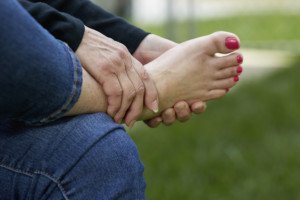
If the arch of your foot has been twitching lately, you need to read this information.
Twitching in the arch of the foot can be very annoying and distracting, but this doesn’t mean it more likely is a serious problem than is not a serious problem.
Have you been reading too many ALS sites and are now scared you might have this deadly disease, since muscle twitching (fasciculations) can be a symptom?
“There are many causes for muscle twitching, most of which are benign,” states neurologist Dr. Mary Dombovy, a neurologist with Rochester Regional Health in New York.
“Most people will have at least some episodes of muscle twitching during their life, and if it is isolated to one area and not associated with other symptoms and goes away in a few hours or days, you don’t need to see a doctor.”
The thing about fasciculations in the arch muscle of your foot is that this location makes the experience particularly bothersome.
But just because something is bothersome doesn’t mean you should worry about it.
What could be the cause of the twitching in the arch of your foot anyways?
Many things could explain it.
Dr. Dombovy says, “Some common causes of muscle twitching include exercise, particularly prolonged exertion, electrolyte abnormalities, muscle or nerve injury, muscle or nerve disease (most of which is not ALS).”

Shutterstock/ Phase4Studios
Though “muscle and nerve disease” are mentioned here, this does not mean that these are the most likely causes of your situation.
They are in the list because these conditions can cause fasciculations. So can Lyme disease, which is caused by getting bitten by a tick.
The arch of the foot takes a good beating every day; all your body weight is on it as you walk and especially as you exercise. This area is subject to plenty of fatigue.

Shutterstock/zoff
Don’t forget that inadequate water intake can also cause fasciculations, and so can insufficient potassium and magnesium, two important minerals.
The key is if you have other symptoms such as weakness, numbness, cramping or pain.
However, cramping could be the result of an overworked arch muscle or even improper footwear.
Pain can be from plantar fasciitis, a benign but sometimes very painful condition. If discomfort is troubling, see a doctor.
“Neurologists have the expertise to sort out the cause by taking a complete history, performing a clinical examination and often performing nerve conduction studies/electromyography, and blood tests,” says Dr. Dombovy.
“If the cause is benign and the symptoms quite bothersome, there are also medications that can help decrease the twitching.”

Dr. Dombovy completed her neurology residency at Mayo Graduate School of Medicine. She is board certified in both neurology and physical medicine and rehabilitation.
 Lorra Garrick has been covering medical, fitness and cybersecurity topics for many years, having written thousands of articles for print magazines and websites, including as a ghostwriter. She’s also a former ACE-certified personal trainer.
Lorra Garrick has been covering medical, fitness and cybersecurity topics for many years, having written thousands of articles for print magazines and websites, including as a ghostwriter. She’s also a former ACE-certified personal trainer.
.









































